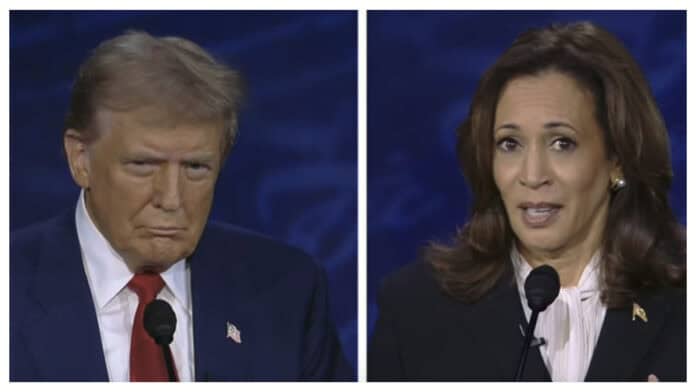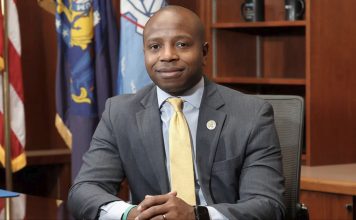This is a WRN analysis piece.
Arguably, Vice President Kamala Harris won the debate on expectations and performance. But former President Donald Trump won the debate on policy, and that’s what really matters.
Harris got generally high marks on performance because she wasn’t a babbling fool, and Biden lowered the debate bar so low. She didn’t get tangled in word salads or stare vacantly into the distance or wander around like a lost dementia patient on stage, so she exceeded expectations. Because she didn’t collapse spectacularly, in a way she didn’t lose, even though her inappropriate smiles and smirks were extremely annoying. She talked so fast about absolutely nothing that one’s mind wandered midway through each Harris soliloquy. It was like she was on a Halloween candy-sugar buzz.
However, Harris didn’t move the needle on policy at all, and that’s where the rubber meets the road. Trump didn’t finish off her campaign tonight, so she will live to fight another day.
RESULTS of our joint @trafalgar_group @InsiderPolling #PresidentialDebate2024 #Battlegroundstate #poll.
1) Supporting for president before the debate.
47% Trump
47% Harris
2% Others
4% Undecided2) Who won the debate?
55% Harris
43% Trump
2% Tie3) Who are you… pic.twitter.com/HT0uKQS4fK
— Robert C. Cahaly (@RobertCahaly) September 11, 2024
Mark our words, though – this debate isn’t going to age well for Harris. Already a poll shows it didn’t boost her support, despite more people thinking she won. That’s because the public doesn’t want razzmatazz right now. They want lower grocery bills.
Another poll shows voters are more likely to think Trump would be better at handling the economy than Harris AFTER THE DEBATE.
Harris talked – a lot. She filibustered, and the extremely biased ABC moderators threw a lot of shiny distraction balls around. However, when the dust settles, it will become increasingly clear that, despite all of the excessive verbiage, Harris never really articulated a plan on the things that matter – the economy and the border, primarily. She never answered the question about how her values could stay the same if so many of her policies changed, either.
Poll after poll shows that voters care most about the economy and the border right now. The moderators’ let’s help Harris sideshows – abortion, climate change, J6, the 2020 election, Harris’s race, on and on – aren’t what they care about most.
Harris’s problem is that people have “event memory.” They’re living it. Voters don’t need a candidate or debate to tell them that they were better off four years ago. They know they paid less for groceries, rent, and car insurance when Trump was president. Harris did nothing tonight to sever herself from Biden’s disastrous policies, either, and she did not articulate a SPECIFIC vision, as much as she babbled about a “new way forward.” It felt like empty rhetoric. She can say, “I have a plan!” and “I’m not Biden!” and “Trump is mean and a danger to democracy!” all she wants, but policy is what voters care about. It reminded us of that old commercial, “Where’s the beef?”
We spoke to a swing voter in Wisconsin, who is 19. She is now leaning toward Trump because she didn’t think Harris explained what she would DO to fix the economy, and she is concerned about foreign wars. She can’t imagine Harris squaring off against Putin. Nobody thinks Putin would eat Trump’s lunch.
Voters know the border was under better control when Trump was president too, and they know the world seemed more peaceful. Harris positioned herself as the candidate of war in this debate. That could have lasting consequences. Trump was strongest on foreign policy. No one thinks Harris would be a tougher negotiator. Is she going to laugh and smirk at Kim Jong Un?
Trump wasn’t perfect. He was too defensive at times and missed some opportunities, and, yes, the moderators were disgustingly biased. They debated Trump but didn’t call Harris out for her numerous lies – the “bloodbath” lie, the Charlottesville lie, the “his 2025 project” lie. But it almost seemed like Trump’s advisors convinced him that he had to watch his tone when debating a woman or he’d come across as a bully. So he overcorrected and toned it down a bit too much. He almost seemed tired.
However, he also came across as more authentic, substantive, and policy-focused, if rougher around the edges, whereas she sounded like she was reciting talking points her advisors had her practice repeatedly, right down to the planned zingers! Someone told her to laugh and smile a lot – with a sort of “there you go again” facial expression – but it didn’t land. It was phony and annoying. At certain junctures, her facial expressions were extremely inappropriate, such as when Trump was talking about the Democrats prosecuting their political opponent, and she laughed.
They say people vote for the person they’d want to have a beer with. No one would want to sit on a bar stool next to Harris and listen to her babble about nothing like that for another hour. She was exhausting. It was tempting to turn off the TV. One observer noted that Harris said nothing memorable, whereas Trump landed some funny lines (run spot run.) And he closed strongly: “Why hasn’t she done it yet?”
He was restrained and policy-focused, while she engaged in bombastic personal attacks. He even got in the line you know they were hoping for – “will you let me talk?” Brilliant.
Normally, voters choose the future over the past. In this very unique situation, people want to return to the way things were four years ago because they know they were better off. This election is going to be exceptionally close. However, this debate isn’t going to help her as much as her supporters think it will.





















![WATCH: Elon Musk Town Hall Rally in Green Bay [FULL Video]](https://www.wisconsinrightnow.com/wp-content/uploads/2022/04/Elon_Musk_3018710552-356x220.jpg)











